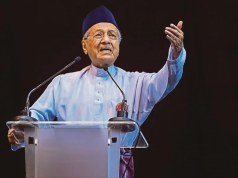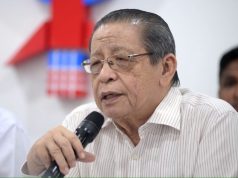KUALA LUMPUR, June 4- Asian countries have been urged to cooperate in order to tackle three challenges, namely climate change, conflict and development to ensure a sustainable economic growth and better future for citizens.
In addressing this, Prime Minister Datuk Seri Najib Tun Razak said the three challenges would test Asia’s capability to stand together as one, with commitment to cooperate, investment of time, resources and political will.
“I believe we will do it. I believe in Asia’s potential. I believe in Asia’s ability to deploy communication in place of conflict, to choose clean energy over climate change, to create opportunities for all, rather than wealth for a few.
“I believe we can make the hard calls required to sustain peace and prosperity in an age of ascendance,” he said in his keynote address at the welcoming dinner and official launch of the 27th Asia-Pacific Roundtable here tonight.


“It must be sustainable, for the new economic powers cannot repeat the mistakes of the old. And the fractures at the heart of Asia’s internal politics must be healed, less they splinter under the weight of the world’s attention,” he said.
With Asian countries deepening their commitment to cooperation, the prime minister believed that Asian states would prosper by strengthening their connections, not just to each other but to the wider world.
“For my country, a bridge between cultures and regions, experience has affirmed our belief in cooperation across borders,” he said.
Touching on the three challenges, Najib said the greatest challenge for Asia today would be climate change due to more frequent, more intense weather, changing rainfalls and rising oceans.
“The secondary effects of climate change are just as worrying. New stresses
are placed on water, food and security systems. In strategic terms, it is a ‘threat multiplier’: magnifying existing risks, increasing instability and making conflict more likely.
“Unless climate risks are controlled, competition for new resources, territorial change and disruption to trade patterns will make the world manifestly less safe,” he said.
With the climate change taking a heavy toll on Asia, Najib stressed that all Asian countries must face climate change together, as one world.
Meanwhile, the prime minister said under the surface of growth and development in Asia, lie dangerous currents of nationalism, aggression and discord, and if it is left unchecked, they would threaten to undo decades of peace and progress.
Najib noted Asia’s strong economic growth, estimated at 5.7 per cent this year, greater than Europe, Africa or the America, has occasionally obscured military build-up that is almost as strong.
Citing the International Institute for Strategic Studies, he said Asia’s defence spending in 2012 rose by nearly five per cent, overtaking the European members of NATO.
“While defence spending should be proportionate to the threats that we face, we must not allow our region to get sucked into an arms race,” said the prime minister.
Citing examples like longstanding tensions in the Korean peninsula to border disputes in Kashmir and the insurgency in the south of Thailand, Najib said Asian countries would always welcome more partners for peace.
However, he reminded Asian countries to be wary of those who would play out wider rivalries in the region.
“Conflict resolution should be pursued within the norms of Asian diplomacy, which emphasises background mediation and discussion. But given the global attention, we should be unafraid to let a little light into the room.
“Openness about strategic aims and positions can draw the poison from international relations. Engagement through conventions, treaties and talks is always preferable to isolation,” said the prime minister.
Therefore, Najib advised that Asian countries should heed the fundamental principles on which good diplomacy was conducted, such as sovereign, equality, respect for territorial integrity, peaceful settlement of dispute and mutual benefit in relations.
Explaining on peaceful resolution, Najib said Malaysia and Thailand, for example, had chosen to enter into a joint development zone in the Gulf of Thailand.
“It is not a permanent fix but agreeing to share prosperity – rather than let it divide us – is infinitely preferable to the alternative,” he said.
Although change in Asia brought a further strategic challenge, one that could not be resolved by diplomacy or treaties was to deliver socio-economic security, said Najib.
As Asian nations, including Malaysia, strive to become high-income developed nations, they must ensure social development is not sacrificed in the name of growth.
“Our final challenge is to ensure Asia’s development brings economic opportunity for all, not riches for a few; that it expands not just nominal gross domestic product figures, but also critical social infrastructure.”
He also looked forward to the completion of the Trans-Pacific Partnership, which would strengthen Asia’s ties with the wider world and the Regional Comprehensive Economic Partnership that would bring three of the largest economies into the world’s largest trading bloc.
Also present were the Regent of Perak Raja Nazrin Shah Sultan Azlan Shah, International Trade and Industry Minister Datuk Seri Mustapa Mohamed and Institute of Strategic and International Studies Malaysia chairman Tan Sri Mohamed Jawhar Hassan.
More than 350 security practitioners and security experts will focus on understanding the dynamic political-strategic change and its impact to the region at the conference themed, ‘Strategising Change in Asia’.
The conference will start tomorrow.
– BERNAMA










